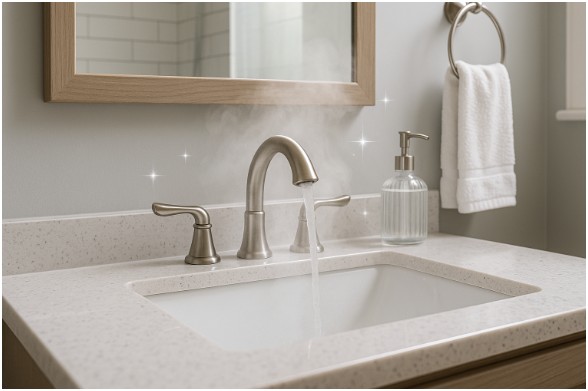I’ll admit it—when my bathroom sink smelled like rotten eggs, I panicked a little. It hit me one morning as I brushed my teeth, and the stench was unmistakable.
That sulfuric, eggy odor made my whole bathroom feel gross no matter how clean it looked. I scrubbed the sink, sprayed air freshener, even lit a candle. Nothing worked.
That’s when I realized this wasn’t about surface cleaning—it was about what was lurking below. So, I decided to get to the bottom of it, and what I found was equal parts fascinating and disgusting.
If your bathroom sink ever smells like rotten eggs, here’s how to figure out where it’s coming from and how to fix it for good.
What Causes That Rotten Egg Smell in the First Place?
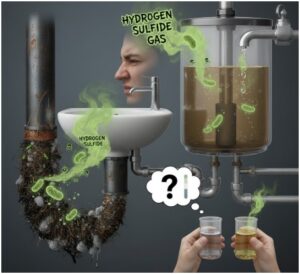
That foul smell usually comes from hydrogen sulfide gas, produced when bacteria feed on grime, hair, and soap scum stuck in your drain.
Over time, these tiny ecosystems grow in dark, damp pipes, releasing the same gas that gives rotten eggs their signature stink.
But sometimes, the problem isn’t just your drain—it’s your water supply. If bacteria make their way into your plumbing system or water heater, even fresh water can carry that sulfur smell.
Before pouring random cleaners down the sink, it helps to test where the odor is actually coming from.
How Do You Tell If the Smell Is From the Drain or the Water?

Here’s the simple test I used, and it works like a charm.
I filled two clean glasses—one with water from the smelly sink and one from a faucet that didn’t smell. Then I took both glasses outside and gave them a good sniff (neighbors probably thought I’d lost it).
- If only the first glass smells, it’s a drain problem.
- If both smell, it’s your water supply.
That quick experiment saved me a ton of guessing—and it told me the problem was hiding in my drain.
What Can You Do If the Bathroom Sink Smells Like Rotten Eggs?
Once I knew my drain was the culprit, I started small. You don’t always need to call a plumber right away. Try these fixes in order—they move from easiest to more hands-on.
Can Baking Soda and Vinegar Really Fix the Smell?
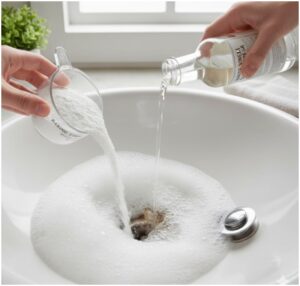
Absolutely. This old-school combo works wonders on drain bacteria and buildup.
Here’s how I did it: I poured ½ cup of baking soda down the drain, followed by 1 cup of white vinegar.
The fizzing started right away, so I quickly covered the drain with a plug. After about 20 minutes, I flushed it with hot water.
That bubbling reaction breaks down gunk and neutralizes odors. Plus, it’s eco-friendly and doesn’t harm your pipes. My bathroom instantly smelled fresher after just one round.
Does Pouring Boiling Water Down the Drain Help?
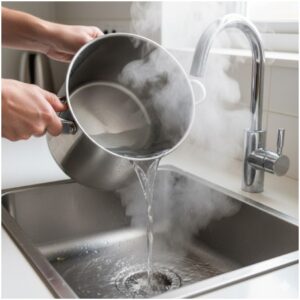
If the smell lingers, boiling water is your next best move. I heated up a big pot of water and carefully poured it straight into the drain. It helps melt greasy buildup and flush away debris.
Just one note—if you have PVC pipes, skip the boiling water and use very hot tap water instead. Boiling water can warp plastic pipes over time.
Sometimes, doing this after the baking soda treatment makes the results even better.
Should You Clean the P-Trap?
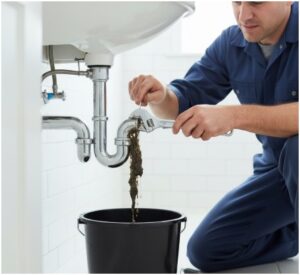
If the first two methods don’t cut it, the P-trap (the U-shaped pipe under the sink) might be the problem.
This little bend is meant to hold water to block sewer gases, but it also traps hair, soap scum, and the occasional mystery sludge.
I placed a bucket underneath, unscrewed the pipe joints with a wrench, and removed the P-trap. Let’s just say—it wasn’t pretty.
After cleaning it out with a wire brush and reattaching it, the smell finally disappeared. Sometimes you just have to face the gunk head-on.
What If the Smell Comes From the Water?
If your bathroom sink smells like rotten eggs even after cleaning the drain, your water supply could be to blame. I learned this the hard way from a friend who had the same issue—it turned out her water heater was the culprit.
Why Does the Smell Only Come From Hot Water?
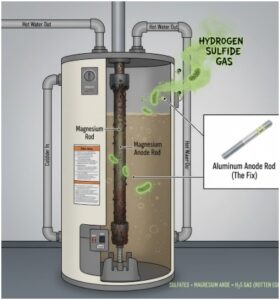
The problem could be the magnesium anode rod inside your water heater. It’s designed to prevent corrosion, but it can react with sulfates in the water, producing hydrogen sulfide gas.
The quick fix? Replace the rod with an aluminum version, or ask a plumber to handle it. Some people temporarily raise their heater temperature to 160°F for a few hours to kill bacteria—but do it carefully to avoid burns or damage.
What If Both Hot and Cold Water Smell Bad?
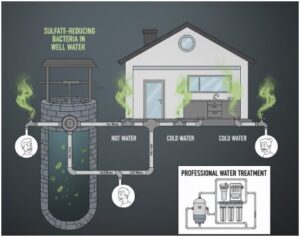
If you notice the odor in all faucets, especially if you’re on well water, the issue might be sulfate-reducing bacteria in your water source.
This is tougher to fix on your own. You’ll need a water treatment specialist to test your water and possibly install a filtration or disinfection system.
I know that sounds like a lot, but clean, odor-free water is worth every penny—trust me.
When Is It Time to Call a Plumber?
If you’ve tried everything and your bathroom sink still smells like rotten eggs, it’s probably time to call in the pros.
You should definitely reach out if:
- The odor comes from multiple drains—it could mean a sewer line issue.
- You hear gurgling sounds from your drains or toilet.
- The smell returns shortly after cleaning.
A plumber can check your main line, vent pipes, and drainage system for deeper blockages or leaks that DIY methods can’t touch.
FAQs About Why the Bathroom Sink Smells Like Rotten Eggs
Why does my bathroom sink smell worse after running water?
That’s usually because bacteria are getting stirred up when water flows through the drain. The pressure releases hydrogen sulfide gas, which smells stronger while the sink is in use.
Can bleach remove the rotten egg smell?
Bleach can temporarily mask the smell but won’t always solve the root cause. It can also harm your pipes if used frequently. I prefer natural solutions like baking soda and vinegar since they’re gentler and safer.
Is it dangerous to breathe in that sulfur smell?
Short exposure isn’t harmful, but high levels of hydrogen sulfide gas can be irritating. If the smell is strong and constant, ventilate your bathroom and call a plumber—it could signal a sewer gas leak.
How often should I clean my bathroom sink drain?
I like to give my drains a baking soda and vinegar rinse once a month. It keeps things fresh and prevents bacteria from building up again.
Smell Be Gone: A Fresh Ending to a Stinky Situation
I’ll never forget how relieved I felt when that awful smell finally vanished. A clean, odor-free bathroom just feels right—like a small victory for your nose and your sanity.
If your bathroom sink smells like rotten eggs, start simple. Test, clean, and only call in backup if you need to. Sometimes, the worst odors come from the easiest fixes.
Pro tip: Once your sink smells fresh again, keep it that way by running hot water after brushing your teeth and giving it a monthly vinegar flush. Your pipes—and your mornings—will thank you.





